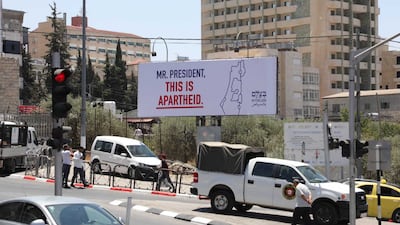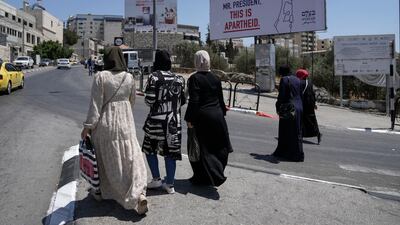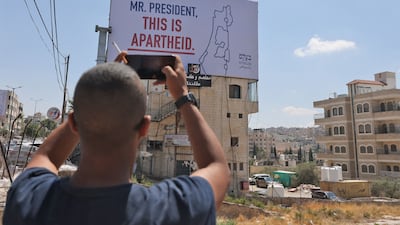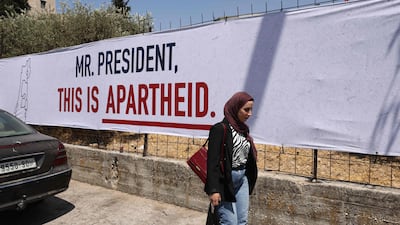The Israeli-occupied West Bank has been filled with billboards carrying stark messages for US President Joe Biden, such as “this is apartheid,” in reference to the growing and increasingly militarised divide between Israeli and Palestinian communities.
The billboards were organised by the Israeli human rights group, B’Tselem, that believes Israel’s treatment of Palestinians, both in the Palestinian territories and inside Israel itself, should be considered a form of apartheid.
Billboards and digital screens were put up in the West Bank cities of Bethlehem and Ramallah ahead of Mr Biden’s visit.
The US president will spend two days in Jerusalem for talks with Israeli leaders before meeting Palestinian President Mahmoud Abbas on Friday.
The talks with Mr Abbas will mark the highest level of face-to-face contact between the US and the Palestinians since former president Donald Trump took a tough approach to the relationship on taking office in 2017.
“US policy treats Israel as though it were running two separate regimes side by side: a permanent democracy [within the country’s sovereign borders] and a temporary military occupation [in the occupied Palestinian Territories],” said a statement by the group.
B’Tselem’s executive director Hagai El Ad accused various administrations in Washington of tolerating Israeli human rights abuses “without demanding accountability” and urged the US to change its attitude towards Israel.
“The US must acknowledge that the area between the Jordan River and the Mediterranean Sea is governed by an apartheid regime, and change its attitude to Israel accordingly,” he said.
“When the attitude changes, so will the regime,” he said.
Upon his arrival at Tel Aviv's Ben Gurion Airport Mr Biden participated in a formal welcome ceremony and received a briefing on Israel’s Iron Dome and Iron Beam air defence systems.
He will visit Jerusalem for a wreath-laying ceremony at Yad Vashem, Israel’s memorial to Holocaust victims in the Second World War.
Mr Biden will hold talks with Saudi officials and attend a summit of regional allies at the weekend, attending a meeting of the Gulf Co-operation Council, plus Egypt, Iraq, and Jordan, known as the GCC+3.
His trip aims to promote regional stability, deepen Israel's integration in the region and counter Iranian influence.
The bio:
Favourite holiday destination: I really enjoyed Sri Lanka and Vietnam but my dream destination is the Maldives.
Favourite food: My mum’s Chinese cooking.
Favourite film: Robocop, followed by The Terminator.
Hobbies: Off-roading, scuba diving, playing squash and going to the gym.
Company%20Profile
%3Cp%3E%3Cstrong%3EName%3A%3C%2Fstrong%3E%20Ovasave%3Cbr%3E%3Cstrong%3EStarted%3A%3C%2Fstrong%3E%20November%202022%3Cbr%3E%3Cstrong%3EFounders%3A%3C%2Fstrong%3E%20Majd%20Abu%20Zant%20and%20Torkia%20Mahloul%3Cbr%3E%3Cstrong%3EBased%3A%3C%2Fstrong%3E%20Abu%20Dhabi%3Cbr%3E%3Cstrong%3ESector%3A%3C%2Fstrong%3E%20Healthtech%3Cbr%3E%3Cstrong%3ENumber%20of%20staff%3A%3C%2Fstrong%3E%20Three%20employees%3Cbr%3E%3Cstrong%3EInvestment%20stage%3A%3C%2Fstrong%3E%20Pre-seed%3Cbr%3E%3Cstrong%3EInvestment%3A%3C%2Fstrong%3E%20%24400%2C000%3C%2Fp%3E%0A
UAE currency: the story behind the money in your pockets
Company%20Profile
%3Cp%3E%3Cstrong%3ECompany%20name%3A%3C%2Fstrong%3E%20Cargoz%3Cbr%3E%3Cstrong%3EDate%20started%3A%3C%2Fstrong%3E%20January%202022%3Cbr%3E%3Cstrong%3EFounders%3A%3C%2Fstrong%3E%20Premlal%20Pullisserry%20and%20Lijo%20Antony%3Cbr%3E%3Cstrong%3EBased%3A%3C%2Fstrong%3E%20Dubai%3Cbr%3E%3Cstrong%3ENumber%20of%20staff%3A%3C%2Fstrong%3E%2030%3Cbr%3E%3Cstrong%3EInvestment%20stage%3A%3C%2Fstrong%3E%20Seed%3C%2Fp%3E%0A
How to apply for a drone permit
- Individuals must register on UAE Drone app or website using their UAE Pass
- Add all their personal details, including name, nationality, passport number, Emiratis ID, email and phone number
- Upload the training certificate from a centre accredited by the GCAA
- Submit their request
What are the regulations?
- Fly it within visual line of sight
- Never over populated areas
- Ensure maximum flying height of 400 feet (122 metres) above ground level is not crossed
- Users must avoid flying over restricted areas listed on the UAE Drone app
- Only fly the drone during the day, and never at night
- Should have a live feed of the drone flight
- Drones must weigh 5 kg or less
Panipat
Director Ashutosh Gowariker
Produced Ashutosh Gowariker, Rohit Shelatkar, Reliance Entertainment
Cast Arjun Kapoor, Sanjay Dutt, Kriti Sanon, Mohnish Behl, Padmini Kolhapure, Zeenat Aman
Rating 3 /5 stars
COMPANY%20PROFILE
%3Cp%3E%3Cstrong%3EName%3A%20%3C%2Fstrong%3EYango%20Deli%20Tech%0D%3Cbr%3E%3Cstrong%3EBased%3A%20%3C%2Fstrong%3EUAE%0D%3Cbr%3E%3Cstrong%3ELaunch%20year%3A%20%3C%2Fstrong%3E2022%0D%3Cbr%3E%3Cstrong%3ESector%3A%20%3C%2Fstrong%3ERetail%20SaaS%0D%3Cbr%3E%3Cstrong%3EFunding%3A%20%3C%2Fstrong%3ESelf%20funded%0D%3Cbr%3E%3C%2Fp%3E%0A
The specs
Engine: 1.5-litre turbo
Power: 181hp
Torque: 230Nm
Transmission: 6-speed automatic
Starting price: Dh79,000
On sale: Now
Top goalscorers in Europe
34 goals - Robert Lewandowski (68 points)
34 - Ciro Immobile (68)
31 - Cristiano Ronaldo (62)
28 - Timo Werner (56)
25 - Lionel Messi (50)
*29 - Erling Haaland (50)
23 - Romelu Lukaku (46)
23 - Jamie Vardy (46)
*NOTE: Haaland's goals for Salzburg count for 1.5 points per goal. Goals for Dortmund count for two points per goal.








